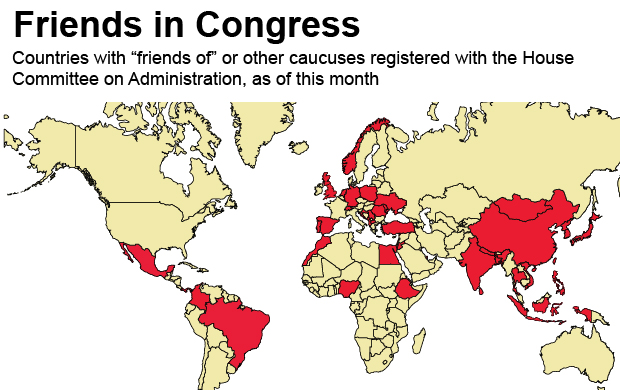
As Scotland prepares to vote Thursday on whether to become an independent nation after a 307-year political union with Britain, members of Congress — like Scottish voters — have strong and varying opinions on the issue.
“I hope they won’t do it. I don’t think Scots will live as good a quality of life if the ‘yeses’ prevail,” said Sen. Roger Wicker, R-Miss., a member of the Senate’s Friends of Scotland Caucus.
Countries with caucuses Caucuses registered with the House Committee on Administration as of Sept. 10. Other countries may have caucuses but aren’t registered.
|
Wicker, who is of Scottish descent, said he understands and empathizes with the lure of the Scottish independence movement.
“I know what the ‘yes’ forces in Scotland are thinking. I understand their heart,” said the lawmaker, who says he currently is reading the final volume of a trilogy on the 14th century Scottish king Robert the Bruce. “I’m immersed in Scotland at the moment.”
But for Scotland’s sake, he said, it’s just not worth leaving the security of a unified Britain.
“The United Kingdom is one of the major economic and geopolitical forces in the history of the world, and I just think it is a grave mistake to toss that away for some impalpable feeling of independence.”
Rep. John Duncan Jr., R-Tenn., a founding member of the House’s Friends of Scotland Caucus, disagrees, saying the country of 5 million people — not London — know best how to govern themselves.
“If I had a vote I’d vote for independence because in my opinion, when it comes to government, smaller is better and closer to the people is better,” said the Scottish-American lawmaker.
But Duncan’s support of the “yes” movement comes with a condition; an independent Scotland should follow a conservative, free-market path.
“If Scotland was to go independent and they follow free enterprise, free market polices — small government policies — they can prosper,” said the east Tennessee Republican, who has meet several times with Scotland’s First Minister Alex Salmond, the leader of the pro-independence Scottish National Party.
“If they go independent and they follow socialist or left wing or big government polices they could have real problems.”
Duncan and Rep. Mike McIntyre, D-N.C., who co-founded the House Friends of Scotland Caucus, this week introduced legislation “recognizing the historical links and friendship between Scotland and the United States and respectfully supporting a truly democratic process.”
The measure counters another non-binding bill filed in early August by a bipartisan group of House members supporting a unified United Kingdom.
Neither bill will go anywhere. But their mere existence shows that Capitol Hill is keeping a close eye on the Scottish vote.
Sen. John McCain, R-Ariz., a member of the Senate Foreign Relations Committee, worries that Scotland would compromise its national security by breaking from the United Kingdom, one of the world’s military mights.
“I don’t see how it could be helpful, not just as far as intelligence ties are concerned, but to the unique military relationship as well,” McCain was reported as telling the Financial Times.
McCain stopped short of fulling endorsing either position, saying he was reluctant to comment on an internal issue in another country.
Sen. Bill Nelson, D-Fla., a member of Senate Armed Services Committee, was more decisive on the matter, saying an independence Scotland would be a “absolute calamity.”
“I hope for the sake of the free world that the Scots don’t vote for independence,” he said. “They’ve got declining oil revenues. Where are they going to get their national and international defense protection?”
The referendum puts the Obama administration in an awkward diplomatic spot. The U.S. has no greater ally than the U.K. and is careful to avoid disharmony with British Prime Minister David Cameron, who is determined to preserve England’s union with Scotland.
Yet the U.S. has had cozy cultural ties with Scotland for centuries. And because the U.S. itself split from Britain, warning Scotland against taking a similar step — particularly in a peaceful, democratic fashion — would smack of hypocrisy.
The administration mostly has stayed on the sidelines. When asked to weigh in on the issue earlier this year, Obama said, “It’s up to the people of Scotland.”
But the administration has hinted it’s satisfied with the U.K.’s current makeup.
“We certainly respect the right of individual Scots to make a decision” on independence, White House press secretary Josh Earnest said Monday. “But, you know, as the president himself said, we have an interest in seeing the United Kingdom remain strong, robust, united and an effective partner.”
